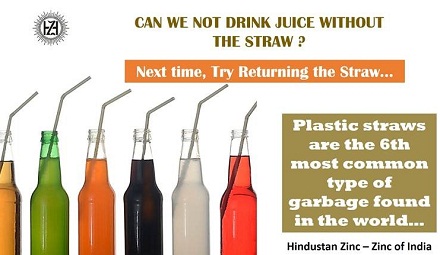The Change begins with ME and soon becomes WE – actually just a flip of putting the foot down…
 A small plastic straw might be something that comes with most beverages that we order, like juice and soft drinks. Remember how many times you have kept the straws aside and drank your drink without the straw.
A small plastic straw might be something that comes with most beverages that we order, like juice and soft drinks. Remember how many times you have kept the straws aside and drank your drink without the straw.
Once made, we use it or not, we are adding to the damage caused by these plastic straws. We are part of the people contributing towards the ‘top 10 garbage found in the ocean’. We contributed to 8.3 billion plastic straws polluting the beaches every year. Can we not drink the juice or soft-drink or cold beverage without the straw ? A lifestyle cannot cause damage to life.
Seattle becomes the first largest U.S. city to ban plastic straws, even though the US still continues to use about 500 million straws every day. Reason – Most plastic straws are too lightweight to make it through the mechanical recycling process. Return is our new addition to the ‘4R’s as part of care for the environment.
According to Forbes, about 120 billion pieces of plastic cutlery in which straws count up to the maximum, are produced in India every year. India is also making efforts to curb this pollution. According to ‘Banega Swachh India’, a 13-year-old boy from Gurgaon has replaced close to 5 Lakh Single Use Plastic Straws till today, and aims to eradicate 1 million by the end of 2018. Several parts of Maharashtra, Karnataka & Kerala have initiated campaigns to reduce the use of plastic straws by 80%, by replacing them with alternatives like bamboo straws, by the end of 2018.
Interestingly, Straws are most commonly made from type 5 plastic, or polypropylene. However, this type of plastic isn’t accepted by most curb side recycling programs. Hence, because of this difficulty, they end up in landfills & polluting our oceans, causing harm to both water and marine life.
The small size of plastic straws makes it dangerous to seabirds, as they misunderstand it for food, and ingest it. According to BBC, several researchers do not agree to the concept of reusable straws, as they present hygiene concerns to people. Some of these concerns include remaining saliva, chewed teeth marks and the spread of illness & diseases because of bad oral hygiene.
Straws on an average weigh 0.42 grams. All the plastic straws in the world that ultimately end up in the ocean, add up to 2,000 tons. Packaging Solutions Giant, Tetra Pak alone produces over 25 billion straws every year. Tetra Pak is developing ‘Paper Straws’ by the end of 2018, to reduce plastic pollution. Plastic straws are the 6th most common type of garbage found in the world.
If we can say NO to STRAWS, who do we want us to tell. Can HZL be the first corporate to REFUSE the use of plastic straws and RETURN to the vendor? It is just a matter of one thought, one decision and one NO.